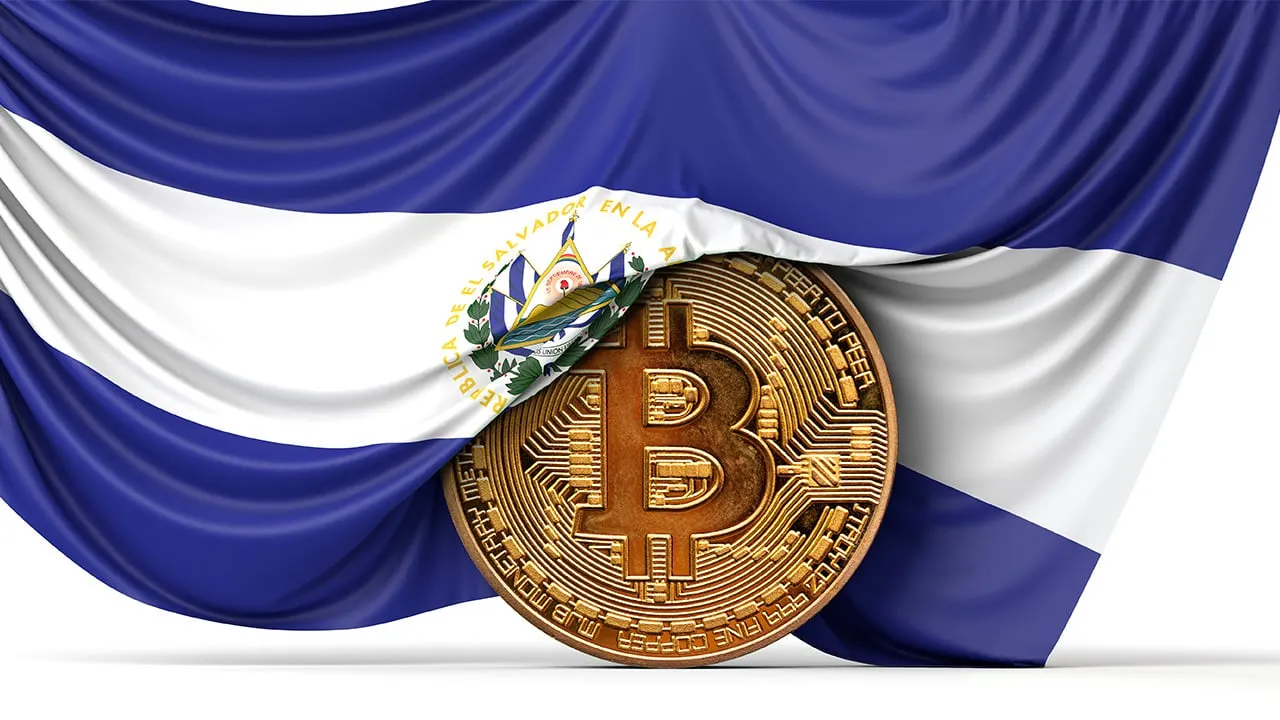🇸🇻EL SALVADOR SECURES $3.5 FUNDING DEAL
➡️Bitcoin remains legal tender
➡️El Salvador will continue buying bitcoin (at possibly an accelerated pace) for its Strategic Bitcoin Reserve
➡️Bitcoin capital markets will continue to be built; for example, the recent tokenized issuance…— Stacy Herbert 🇸🇻🚀 (@stacyherbert) December 19, 2024
Coin Prices
BTC
$64,794.00
2.93%ETH
$1,881.93
3.31%XRP
$1.36
2.06%BNB
$590.31
0.09%USDC
$0.999997
0.01%SOL
$81.17
6.08%TRX
$0.28616
1.74%FIGR_HELOC
$1.034
0.25%DOGE
$0.091612
0.53%WBT
$48.37
2.32%BCH
$495.87
2.15%USDS
$0.999904
0.00%ADA
$0.262811
2.23%LEO
$8.82
14.05%HYPE
$26.86
2.23%XMR
$332.18
7.08%CC
$0.160853
0.23%USDE
$0.999041
0.01%LINK
$8.38
2.68%XLM
$0.151178
1.49%USD1
$0.999688
0.07%RAIN
$0.00931842
1.11%HBAR
$0.096115
2.78%PYUSD
$0.999825
-0.08%LTC
$52.12
3.30%ZEC
$237.01
2.34%AVAX
$8.44
2.49%SHIB
$0.00000594
0.44%SUI
$0.868058
1.38%TON
$1.28
-3.45%WLFI
$0.113545
6.32%CRO
$0.074994
1.58%XAUT
$5,180.73
0.60%M
$1.44
3.56%PAXG
$5,213.69
0.46%UNI
$3.45
4.34%DOT
$1.26
1.45%BUIDL
$1.00
0.00%MNT
$0.593797
2.71%AAVE
$115.99
3.29%USDF
$0.99756
0.03%ASTER
$0.694127
0.18%PEPE
$0.00000394
1.40%TAO
$170.99
2.75%USDG
$0.999875
-0.01%USYC
$1.12
0.00%OKB
$74.61
2.67%RLUSD
$1.00
0.01%BGB
$2.22
0.71%SKY
$0.066734
6.62%PI
$0.163704
0.87%HTX
$0.00000165
-0.23%BFUSD
$0.999653
0.08%ETC
$8.31
1.70%NEAR
$0.979293
1.06%ONDO
$0.249981
2.44%ICP
$2.17
7.10%POL
$0.111893
6.99%USTB
$11.00
0.03%GT
$6.82
2.60%KCS
$8.42
3.35%WLD
$0.384234
5.11%PUMP
$0.00170824
-1.74%ATOM
$2.04
-1.88%HASH
$0.01727014
0.79%NIGHT
$0.05679
-1.14%QNT
$63.70
2.50%USDTB
$0.999704
-0.03%NEXO
$0.833142
2.81%ENA
$0.09954
4.23%PIPPIN
$0.808198
9.50%EUTBL
$1.24
0.21%FLR
$0.00933488
4.41%TRUMP
$3.38
4.03%KAS
$0.02912583
-0.62%ALGO
$0.08429
1.60%OUSG
$114.40
0.01%USDD
$0.999812
0.06%JAAA
$1.027
0.01%RENDER
$1.36
1.22%USDY
$1.11
0.46%FIL
$0.889768
2.14%XDC
$0.03307709
-1.70%APT
$0.835625
3.77%MORPHO
$1.75
12.56%VET
$0.00710972
-0.68%BDX
$0.08008
0.05%JTRSY
$1.095
0.01%USD0
$0.99736
-0.15%ARB
$0.091627
0.65%GHO
$0.999712
0.01%STABLE
$0.02857688
-1.07%BONK
$0.00000577
0.66%A7A5
$0.01283133
-1.47%TUSD
$0.998598
0.02%DCR
$27.98
6.57%JUP
$0.145759
3.21%KITE
$0.262924
11.69%FTN
$1.088
0.03%USDAI
$0.99998
0.04%EURC
$1.18
0.05%SEI
$0.067105
2.32%STX
$0.241106
4.01%VIRTUAL
$0.643518
11.07%DASH
$32.80
4.46%PENGU
$0.00653887
5.46%JST
$0.04593907
2.51%CAKE
$1.22
1.06%XTZ
$0.370671
1.00%KAU
$166.79
0.66%FDUSD
$1.00
0.09%ETHFI
$0.503792
14.82%IP
$1.016
0.59%LIT
$1.42
5.53%FET
$0.152963
1.16%CTM
$0.079481
3.15%CRV
$0.232541
6.22%CHZ
$0.03327389
-1.24%PRIME
$1.02
0.03%USX
$0.99984
0.01%NFT
$0.00000033
0.03%BTT
$0.00000033
1.14%GNO
$122.01
3.74%BSV
$16.05
8.06%SUN
$0.0164687
-0.21%KAIA
$0.053825
2.73%INJ
$3.12
-2.64%ADI
$3.15
0.43%AERO
$0.326799
9.64%ZRO
$1.46
-1.96%PYTH
$0.051541
3.97%CRVUSD
$0.99717
0.24%IOTA
$0.066131
1.18%JASMY
$0.00565711
1.51%GRT
$0.02601238
1.84%FRAX
$0.989774
-0.27%FLOKI
$0.00002812
2.13%OHM
$17.32
2.28%TIA
$0.303937
4.03%SPX
$0.289059
6.91%SIREN
$0.363026
25.68%HNT
$1.41
3.89%BTSE
$1.61
-0.83%H
$0.142327
11.29%2Z
$0.073917
10.70%LDO
$0.300395
2.33%CFX
$0.04909749
2.23%SYRUP
$0.218845
9.49%OP
$0.117058
0.30%AB
$0.00247889
0.17%TEL
$0.00255434
2.08%ENS
$6.05
1.97%NUSD
$0.998553
-0.05%STRK
$0.04144312
3.81%MON
$0.02025697
1.29%YLDS
$0.999996
0.00%USDA
$0.988417
0.03%AXS
$1.28
4.17%USTBL
$1.075
0.01%AUSD
$0.999848
-0.03%SAND
$0.079006
1.89%UDS
$1.69
0.14%TWT
$0.501554
1.16%BCAP
$22.79
0.00%FT
$0.099259
0.57%PENDLE
$1.23
3.68%ZBCN
$0.00207828
3.42%ULTIMA
$5,361.20
4.01%APEPE
$0.00000095
-0.40%XPL
$0.086797
2.24%WIF
$0.192878
-2.40%BORG
$0.196173
6.77%LUNC
$0.00003501
1.53%PC0000031
$1.00
0.00%VSN
$0.052177
0.89%FF
$0.079718
5.00%NEO
$2.63
0.03%ZK
$0.01983323
5.40%RIVER
$9.29
11.91%THETA
$0.180948
-1.45%FDIT
$1.00
0.00%BAT
$0.119104
4.40%SENT
$0.02426868
6.66%TIBBIR
$0.176187
18.50%XCN
$0.00473861
1.15%BARD
$0.773052
2.43%COMP
$17.97
5.54%MANA
$0.08932
-0.21%IUSD
$0.999776
-0.05%9BIT
$0.02021278
-0.83%CVX
$1.79
4.59%MX
$1.79
0.17%GALA
$0.00344511
0.93%WFI
$2.02
-1.15%KOGE
$48.00
0.04%VVV
$3.64
1.40%RAY
$0.594595
2.51%REAL
$0.051027
3.96%SATUSD
$0.995648
0.13%FLUID
$2.00
6.10%EURS
$1.26
0.03%DEXE
$3.32
11.52%XEC
$0.00000756
1.59%FARTCOIN
$0.151703
9.10%USDF
$0.998212
0.02%GUSD
$0.999825
0.09%GLM
$0.148178
-0.87%S
$0.03919676
0.85%THBILL
$1.014
0.10%POWER
$0.677184
33.01%TRAC
$0.3145
0.68%WEMIX
$0.303403
-2.07%0G
$0.645974
5.40%RUNE
$0.39285
3.51%SKR
$0.02425916
-17.98%IMX
$0.161825
7.53%ACRED
$1,097.76
0.00%RLB
$0.074931
2.39%A
$0.079751
3.51%GOMINING
$0.319047
-0.24%ZANO
$8.45
-2.86%EGLD
$4.32
1.90%SNX
$0.367156
3.40%BERA
$0.587472
4.19%COCO
$0.126255
-0.17%1INCH
$0.089255
3.24%SFP
$0.251515
0.34%KTA
$0.252431
5.30%B
$0.12453
-6.34%OZO
$0.131497
0.85%JTO
$0.281904
1.89%MWC
$11.29
-12.59%AR
$1.87
2.13%BAN
$0.122948
0.06%AMP
$0.00144397
1.40%DOLA
$0.995214
0.07%LION
$0.00393162
2.56%COW
$0.214942
-1.26%PUSD
$1.001
0.00%WAL
$0.07338
1.86%CASH
$0.999719
-0.00%CUSD
$0.972117
-3.18%FOGO
$0.03027513
9.38%LPT
$2.29
2.16%EIGEN
$0.189513
3.82%REUSD
$1.062
0.01%BMX
$0.331606
-1.45%QRL
$1.43
-2.01%
